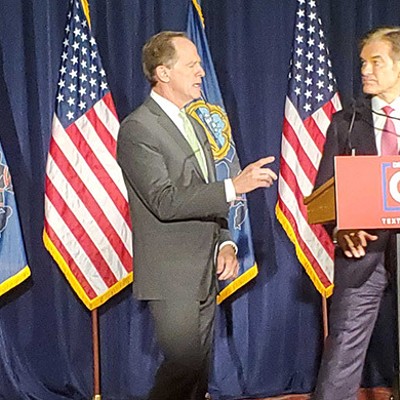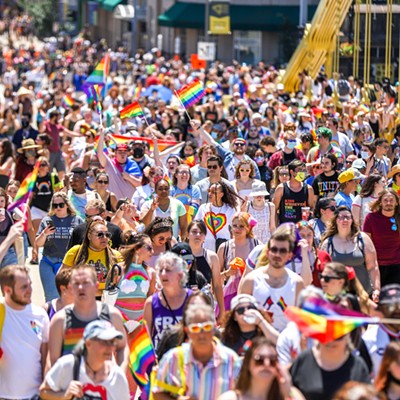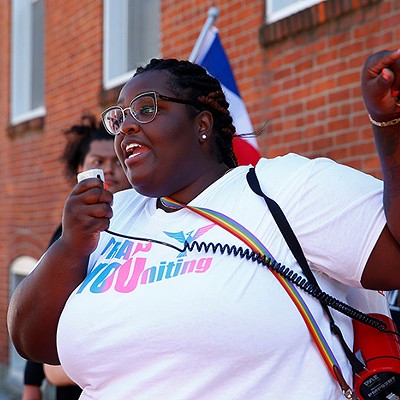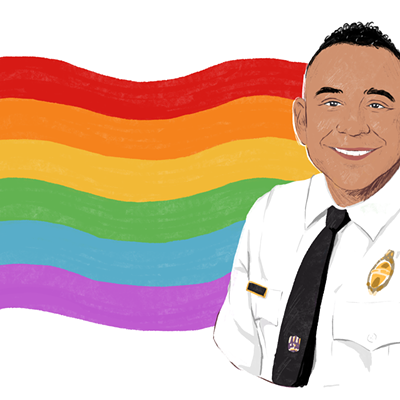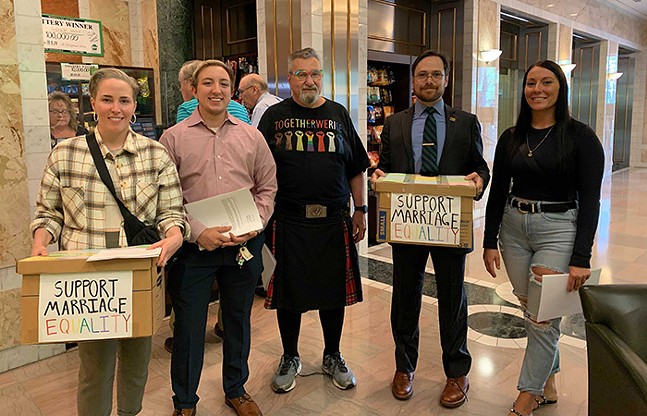
A group of five LGBTQ activists today delivered “thousands” of letters to Sen. Pat Toomey’s Pittsburgh office, urging the senator to vote in favor of the Respect for Marriage Act. Although the group had made and confirmed an appointment with a member of Toomey’s staff to deliver the letters and discuss their concerns, the staffer refused — without explanation — to come to the lobby to meet with the activists at the appointed time.
Despite this, advocates say they are optimistic Toomey will vote yes on the Respect for Marriage Act, a bill to codify federal protections for existing same-sex and interracial marriages. In the past, the Republican senator has broken ranks with his party to support repealing Don’t Ask, Don’t Tell and also voted for a bill prohibiting employment discrimination on the basis of gender or sexuality.
“I think it’s very possible [Toomey] might vote in favor of the bill,” says Human Rights Campaign regional organizer Drew Medvid, who coordinated today’s letter drop. “It has bipartisan support. Forty-seven Republicans in the House of Representatives voted for it,” says Medvid, also citing the support of a handful of Republican senators including Susan Collins (R-Maine) and Rob Portman (R-Ohio).
“We do believe that it will pass, but only through measures like this,” adds Medvid in reference to the letter drop.
The Human Rights Campaign has coordinated similar actions in recent months targeting Republican senators seen as potential affirmative votes.
“Really, it's about the right to exist in public,” Ian Price, one of the individuals who came to deliver the letters, tells Pittsburgh City Paper. “When the Supreme Court legalized marriage equality, that made it acceptable to be a queer couple in public, in a family group. Legal recognition is more than just legal recognition. It's recognition by the community, the state, the nation that you really are a couple.”
Pastor Robear Wilson, another activist who helped deliver the letters, tells City Paper he wants to convey to Toomey that the Respect for Marriage Act is not a threat to religious freedom, as some right-wing Christians claim.
“The bottom line is because the way the church is established in this country, the pastor has the last word. So a pastor can choose not to marry somebody just because they don't like the color of your hair. They're putting it out there, like, ‘We're gonna have to do things we don't want to do,’ and all that which is all nonsense, quite frankly.”
The Respect for Marriage Act passed the House of Representatives in July with bipartisan support in what the ACLU called “the most pro-LGBTQ vote in Congressional history.” It is not currently clear whether the bill will garner enough Republican votes to pass the Senate.
The bill came about in response to Justice Clarence Thomas’ suggestion in his Dobbs v. Jackson opinion that the Supreme Court should “reconsider” its 2015 decision in Obergefell v. Hodges, which legalized same-sex marriage on the federal level, as well as its 1965 decision affirming the rights of married couples to use contraception and its 2003 decision striking down a Texas law that criminalized consensual gay sex.
According to the ACLU, however, if the Supreme Court did overturn Obergefell, the Respect for Marriage Act would not stop states from refusing to issue marriage licenses to gay couples. States would be forced to acknowledge existing gay marriages but it would not force states to allow new marriages.
UPDATE: Thu., Sept. 15 at 11:30 a.m. — a previous version of this story mistakenly referred to the Human Rights Campaign as the Human Rights Commission.




